Across the globe, consumers are altering their path to purchase and increasingly turning to online channels to address their shopping needs in response to the lingering effects of COVID-19. With this shift, the need for retailers to be digitally-focused and pivot from conventional to omnichannel retailing is critical to remain competitive and relevant to the post-pandemic shopper. From expanding e-commerce platforms, diversifying fulfillment solutions and digitizing the in-store experience, a comprehensive approach is required to satisfy new shopping expectations and maintain connectivity with the shopper. As the race to become more omnichannel intensifies, Private Brands will play an even more important role in serving as a competitive advantage. With growing Private Brand relevancy amidst the aftermath of COVID, retailers have the opportunity to better leverage their Private Brands, particularly online where they have historically been under-represented. Maximizing visibility of Private Brands across digital platforms, including e-commerce, mobile apps, in-store technologies and digital intermediaries will be key to competing in the new omnichannel landscape and driving growth for the banner and brands. Here is an inside look into how the shift to omnichannel is impacting retail and Private Brands around the globe.


EUROPE

SOUTH AFRICA

CHINA
 The community group-buying model, centering on bulk delivery, is on the rise in China this year, which is to greatly approach more new customers within the retailers’ radius and to allow consumers to voice their concerns about products as their community leader is just a Wechat message away. This model also focuses on selling groceries and daily necessities, and building trust among shoppers who are looking for healthy consumable items. Moreover, Private Brands such as ready-to-eat and paper products make up a significant proportion of the categories involved and is a highly effective option for building trust due to their value equation ratio.
The community group-buying model, centering on bulk delivery, is on the rise in China this year, which is to greatly approach more new customers within the retailers’ radius and to allow consumers to voice their concerns about products as their community leader is just a Wechat message away. This model also focuses on selling groceries and daily necessities, and building trust among shoppers who are looking for healthy consumable items. Moreover, Private Brands such as ready-to-eat and paper products make up a significant proportion of the categories involved and is a highly effective option for building trust due to their value equation ratio.
Read the full article HERE



